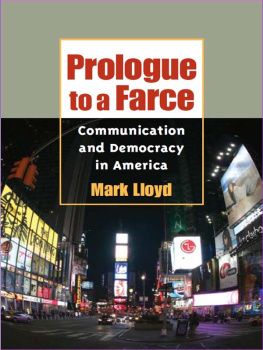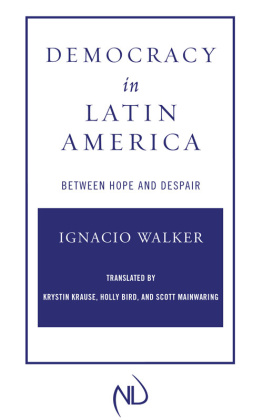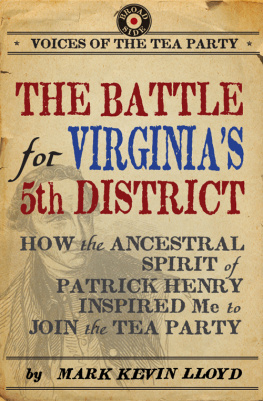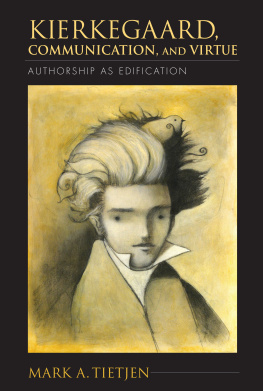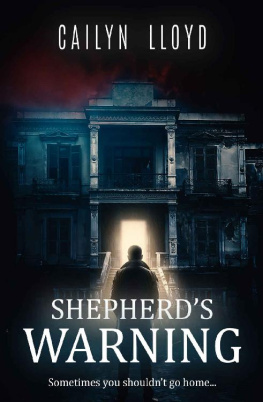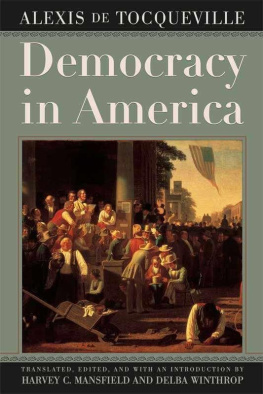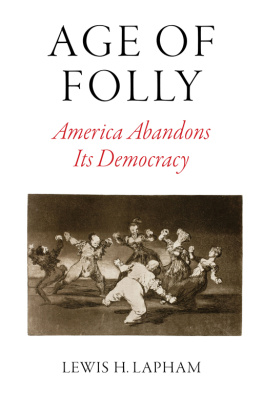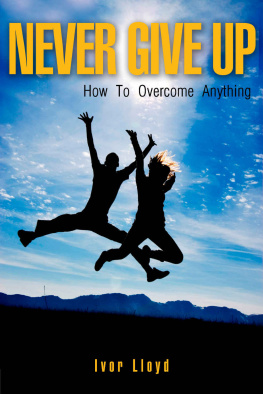Prologue to a Farce
THE HISTORY OF COMMUNICATION
Robert W. McChesney and John C. Nerone, editors
A list of books in the series appears at the end of this book.
Prologue to a Farce
Communication and Democracy in America
MARK LLOYD
UNIVERSITY OF ILLINOIS PRESS
Urbana and Chicago
2006 by Mark Lloyd
All rights reserved
Manufactured in the United States of America
1 2 3 4 5 C P 5 4 3 2 1

This book is printed on acid-free paper.
Library of Congress Cataloging-in-Publication Data
Lloyd, Mark.
Prologue to a farce : communication and democracy in America / Mark Lloyd.
p. cm. (The history of communication)
Includes bibliographical references and index.
ISBN-13: 978-0-252-03104-5 (cloth : alk. paper)
ISBN-10: 0-252-03104-0 (cloth : alk. paper)
ISBN-13: 978-0-252-07342-7 (pbk. : alk. paper)
ISBN-10: 0-252-07342-8 (pbk. : alk. paper)
1. Communication policyUnited StatesHistory. 2. DemocracyUnited States. I. Title.
P95.82.U6l58 2006
302.240973dc22 2006020912
To Kelly
who gives me hope
Contents
Acknowledgments
This book is a product of many years of experience and study. I can hardly name all of the influences, much less thank all of the librarians in Boston, Cambridge, and Washington who were so patient with me, the students who inspired me, the colleagues and teachers who challenged me to clarify my thoughts, and the friends who encouraged me to put them on these pages. I am especially indebted to Richard John, Kay Mills, and Bob McChesney, true historians who provided thoughtful comments and saved me from too many errors to mention. I would like to acknowledge a special debt to Ceasar McDowell, who helped me form the Civil Rights Forum on Communications Policy and brought me into the fold at the Massachusetts Institute of Technology. Many of the ideas presented here were developed at the Forum and honed at MIT. Thanks as well to Ike Colbert and David Thorburn, who provided support, constructive criticism, and guidance while I was there. I would also like to thank Woody Wickham, formerly of the MacArthur Foundation; Jon Funabiki, Alan Jenkins, Becky Lentz, and Alison Bernstein at the Ford Foundation; and Helen Brunner and the sisters at the Alfred P. List Foundation for all their support over the years. A special thanks to Gara LaMarche at the Open Society Institute, a true servant of democracy, and to my good friend Jack Willis, who provided both financial support and wise counsel. Thanks as well to Larry Grossman, who through the Digital Promise project continues to prod our elected representatives to support what Madison calls popular knowledge. Many of the ideas in this book were first articulated in an essay Larry commissioned me to write with funding from and published by the Century Foundation. Thanks also to Susan Kretchmer; the Computers Professionals for Social Responsibilities, and Sage Publications. Many of the ideas presented here about the impact of advanced communications technologies on our democracy were first presented at a CPSR conference and were published by Sage. Thank you to Kerry Callahan, who has shepherded this project with patience and good humor. And finally, thank you to my first teachers, my parents. What is written in these pages does not suggest agreement by those who have guided or supported me, and while I take full responsibility, this book would not be possible without their help.
Introduction
On October 5, 2000, I sat in a private room at the Museum of Television and Radio in New York listening to Bill Kennard, the chairman of the Federal Communications Commission (FCC), practice a speech about the public interest obligations of broadcasters. At the time I was leading a national coalition called People for Better TV, and aside from helping to rustle up an audience and pay for coffee, my role was to introduce Bill. Listening to him prepare, I was excited about the strength and breadth of his embrace of our work. He would tell the nation:
I want to cut the Gordian knot of public interest vs. financial interests, and outline clear, tangible public interest obligations that broadcasters can commit to. I want to ensure that the American people are suitably compensated for the use of their valuable spectrum, and that underutilized portions of this precious resource are returned to them as soon as possible. And I want to see that the awesome power and remarkable ubiquity of television is put to the service of our democracy, rather than at the expense of it. We are the strongest, most vibrant democracy this world has ever seen. But we owe it to ourselves and to the nations who view us as a role model of democratic governance to realize the enormous promise of communications technologies old and new in serving and enhancing democracy.
It had taken us a couple of years to secure this commitment from the chairman of the FCC. Over the course of that time, I introduced Bill to a few dozen of our coalition members at his boardroom in Washington and at a community center in San Francisco. We also met with other commissioners at locations across the country, collected thousands of signatures, monitored television stations and inspected the public files of stations in a dozen communities, and submitted several formal petitions and comments to the FCC.
About three weeks earlier, on September 14, 2000, the FCC proposed a set of public interest rules, quoting heavily from our submitted comments. The core of those rules focused on making the local broadcaster more accountable to the local community, to replace the issues/programs list with a standardized form and to enhance the publics ability to access information on a stations public interest obligations by requiring broadcasters to make their public inspection files available on the Internet. This was the lynch-pin, the first step toward bringing the public back into a civic conversation dominated and limited by local television broadcasters. While it was just the first step, it was a step forward. We were not struggling to save established rights under attack, we were advancing.
In many ways, this moment at the Museum of Television and Radio would also be the culmination of a personal journey. Inspired by the civil rights movement of the 1960s and the youth and Black Power protests of the 1970s, I became a broadcast journalist. I produced public affairs programs and news reports and documentaries at a time when the industry was just opening up to community voices and young black journalists. The years between 1972 and 1984 were a sort of golden era of public interest broadcasting in the United States. I did not know this, of course, until they were over. By 1985 I was producing newscasts at CNN in Washington, D.C., and was soon convinced that the only way to reverse the trend of superficial happy talk and the obsession with celebrity was to push for change from the outside.
After graduating from Georgetown Law School, I worked for a few years at a law firm in Washington specializing in representing the communications industry. But soon I helped to found an organization to bring the concept of equal rights for citizens into the debate over communications policythe Civil Rights Forum on Communications Policy. Through this organization, and with the help of many others, I was able to draw together a diverse coalition that included the American Academy of Pediatrics, the Consumer Federation of America, the League of United Latin American Citizens, the National Association of the Deaf, the National Organization for Women, the National Urban League, Mark Crispin Millers Project on Media Ownership at NYU, the U.S. Catholic Conference, and over a hundred other organizations in over a dozen communities across the country.Society Institute, we believed that by making TV better, we would make America better. On that early morning in October in New York, I was convinced that the chairman of the FCC was with us all the way. He would say:
 This book is printed on acid-free paper.
This book is printed on acid-free paper.
